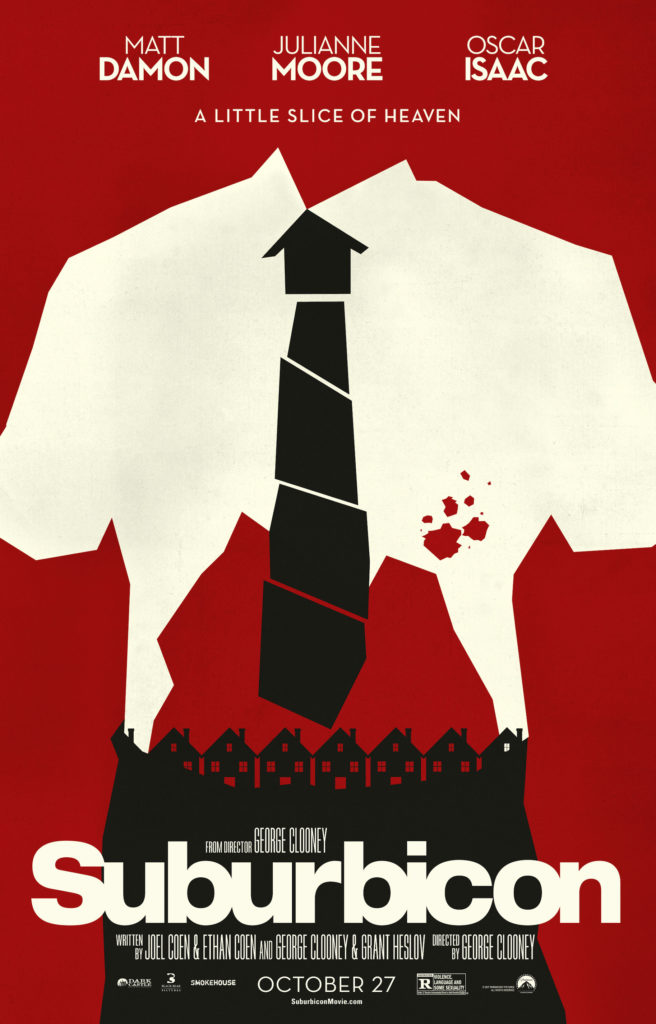“Suburbicon,” directed by Golden Globe winning actor George Clooney, is set in the year 1959 in an all-white suburb. The film opens with a ‘happy-go-lucky’ type advertisement for the neighborhood intended to attract like-minded and ‘diverse white families’ from all parts of the country.
Suburbicon takes place in a tight-knit neighborhood. When anything new or suspicious happens in “Suburbicon,” the whole community knows. Gardner Lodge, played by Matt Damon, is a husband and father who works in an office—think of any male character in “Mad Men.” Gardner is married to his wife Rose (Julianne Moore) and they have a son, Nicky (Noah Jupe). When the Mayers, a black family, moves into the neighborhood, the community fears about the negative changes they might bring to the otherwise white suburbia.
Because the Mayers family and the Lodge family both have young boys, Nicky’s aunt encourages him to invite “the black boy,” Andy Mayers (Tony Espinosa) , to play baseball and show formal acceptance of their new neighbors. That same night, the Lodge’s home is invaded by two mobsters seeking valuables and violence. The soundtrack to the film builds suspense as the ‘perfect’ neighborhood starts to crumble. Nicky witnesses his mother’s murder amid the chaos.
The mob continues to plague the family while the murder investigation only complicates the situation and heightens emotions. On a ride home from the police station, Gardner and Rose’s sister Maggie chatter about trivial topics, while Nicky is in the backseat baffled by their nonchalant attitude toward Rose’s tragic death. The film uses scenes such as this to highlight 1950s awkwardness between adult and adolescent characters.
Adult characters in “Suburbicon” are portrayed as dictatorial figures who do not care for the opinion of their children. In numerous scenes, Nicky is spoken to in condescending ways, left without an avenue to defend himself. The emotional disconnect between Gardner and his son is infuriating to watch.
Through suspenseful and emotional scenes, “Suburbicon” utilizes a powerful soundtrack, which ties together the plot and the actors’ performances and makes the film more appealing overall.
White supremacy is a prominent theme in “Suburbicon”, but the writers did not directly address it in any of the scenes. Instead, the quick transitions between emotional racially charged scenes and comic-relief feel inappropriate and uncomfortable at times.
In one scene, the white community is in the Mayers’ yard harassing the family and sabotaging their car, while Gardner is riding around trying to dispose of a dead body on a children’s bike. There were satirical moments where this juxtaposition felt appropriate, but other scenes that touched on elements of race and gender were difficult to swallow amid the wacky humor of the film.
“Suburbicon” could be likened to a Greek tragedy, filled with surprising twists, star-crossed romance, and merciless killings. Not only was there denial, deception and abuse but also a good deal of heartbreak for the two little boys. Both children seek some form of normality and safety, but it is unattainable by the turmoil that surrounds them.
Nicky and Andy are the redeeming characters in the film and the only two characters worth rooting for. During “Suburbicon”, Nicky’s character develops from a bystander to a victim, and then from a victim to a fighter. Through Nicky’s character growth, the film portrays how the innocence of a child becomes tainted by their social reality as they age.
Overall, while the soundtrack for the film was enticing and the execution of the era was spot-on, there were moments when “Suburbicon” lacked the grace necessary for a comedy that wrestles with sensitive topics of race and violence.
The editor may be reached at
[email protected]








![Jordan Ward [REVIEW]](https://seattlespectator.com/wp-content/uploads/2024/04/ward_1-1200x800.jpg)

![COWBOY CARTER [REVIEW]](https://seattlespectator.com/wp-content/uploads/2024/04/Screenshot-2024-04-10-at-7.37.52 PM-1200x699.png)
